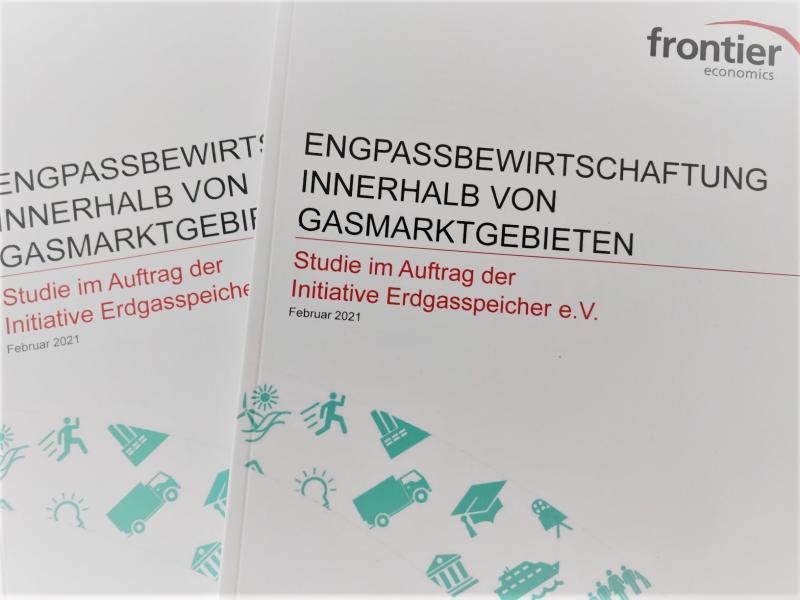
24.02.2021
In a recent study the Initiative Erdgasspeicher (INES) provides recommendations on how to improve so-called market-based instruments in the gas market. These instruments can help aligning conventional gas network development with climate targets. The study was conducted by Frontier Economics by order of INES.
The study was presented in a virtual press conference by INES’ Management Director Sebastian Bleschke and Dr. David Bothe of Frontier Economics on 9th February 2021. The study develops general principles to select so-called market-based instruments and gives recommendations for a cost-efficient combination of instruments for congestion management in gas market areas. Market-based instruments allow for congestion management in gas markets without conventional network development. They are used for the first time in connection to the integration of the German market areas Gaspool and NetConnect Germany on 1st October 2021. However, market-based instruments are relevant beyond the scope of the market integration.
Sebastian Bleschke comments the publication as follows: “Looking at climate targets and a continuing energy transition, planning and construction of gas transmission networks holds large insecurities. Therefore, we need a paradigm shift. Rigid and long-ranging gas network development should be substituted by more flexible and market-based instruments to avoid investments with long amortization periods by a more efficient use of existing pipelines and storage facilities.”
Insecurities are related to heavily divergent forecasts on future natural gas demands and network usage uncertainties after the German market integration. Developing market-based instruments can contribute largely to dealing with these insecurities as market-based instruments can be adapted flexibly. Quite in contrast, network development cannot be revised.
Congestion management within the framework of the German market area integration momentarily entails making use of three market-based instruments. Using VIP Wheeling gas is supposed to be allocated optimally in Virtual Interconnection Points (VIP) to avoid possible congestions. Third-party network use is supposed to manage congestions by booking and using transport capacities in neighboring, foreign transportation networks. The spread product, finally, operates like a virtual transport, when gas is bought and sold in different congestion zones at the same time.
The current study analysed these and other market-based instruments looking at their advantages and disadvantages concerning the future German gas market. It makes two main proposals on enhancing the current combination of instruments. Author and Head of Project Dr. David Bothe concludes as follows: “The spread product already entails the option of third-party network use. Defining third-party network us as a separate instrument thereby leads to market inefficiencies without visible benefits. Introducing VHP Storage Wheeling as an additional instrument, however, could open up new potentials for congestion management."
VHP Storage Wheeling is an instrument that uses virtual storage zones of gas storage facilities for congestion management. Gas storage facilities at different locations thereby act as a single entity in the market. Operators of virtual gas storage facilities decide at which facilities of a zone gas is actually injected or withdrawn. VHP Storage Wheeling uses this flexibility for the network.
Downloads: